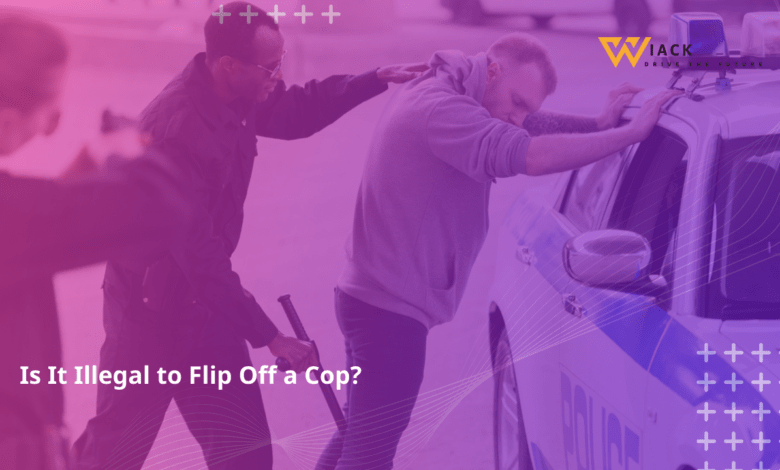Is It Illegal to Flip Off a Cop?

Did you know that in the United States, over 6,000 people are arrested each year for alleged disorderly conduct towards police officers? This startling statistic highlights the complex relationship between law enforcement and citizens, especially when it comes to expressing dissent or frustration. One particularly contentious issue is the act of “flipping off” a police officer. But is it illegal to flip off a cop? Let’s dive into this controversial topic and explore the legal, social, and practical implications of this gesture.
Understanding the Gesture
Before we delve into the legality of flipping off a cop, it’s important to understand what this gesture means and how it’s interpreted in different contexts.
The Meaning of “Flipping Off”
Flipping off, also known as “giving the finger” or “the middle finger salute,” is a hand gesture that involves extending the middle finger while keeping the other fingers folded against the palm. This gesture has a long history, dating back to ancient Greece and Rome, where it was known as the digitus impudicus or “impudent finger.”
In modern times, flipping someone off is universally recognized as an obscene or offensive gesture. It’s typically used to express extreme displeasure, contempt, or defiance towards someone or something. When directed at a police officer, it’s often seen as a sign of disrespect or challenge to authority.
Non-Verbal Communication and Intent
As a form of non-verbal communication, the middle finger gesture carries strong emotional and social connotations. When someone flips off a cop, their intent may vary:
- Expressing frustration with law enforcement
- Protesting perceived injustice or abuse of power
- Asserting one’s rights and freedom of expression
- Deliberately provoking a reaction
Understanding the intent behind the gesture is crucial, as it can influence how both the officer and the legal system interpret the action.
Legal Considerations
Now, let’s address the central question: Is it illegal to flip off a cop? The answer isn’t as straightforward as you might think and involves several legal considerations.
First Amendment and Freedom of Speech
The First Amendment to the United States Constitution protects freedom of speech, which includes various forms of expression beyond just spoken words. Courts have consistently held that symbolic speech, including gestures like flipping off, is protected under the First Amendment.
In fact, several court rulings have specifically addressed the issue of giving the middle finger to police officers:
- In 2019, the U.S. Court of Appeals for the 6th Circuit ruled that flipping off a police officer is constitutionally protected speech.
- The 2nd U.S. Circuit Court of Appeals stated in 2013 that the “ancient gesture of insult” is not grounds for arrest or prosecution.
These rulings suggest that, in general, it is not illegal to flip off a cop solely based on the gesture itself.
Disorderly Conduct and Disturbing the Peace
While the gesture itself may be protected speech, the context in which it’s used can sometimes lead to charges of disorderly conduct or disturbing the peace. These laws vary by state but generally prohibit behavior that disrupts public order or incites others to breach the peace.
For example, if someone flips off a cop while also shouting obscenities in a crowded area, they might be charged with disorderly conduct based on the totality of their behavior, not just the gesture.
Interference with an Officer’s Duties
Another legal consideration is whether the act of flipping off a police officer interferes with their ability to perform their duties. If the gesture is accompanied by actions that physically impede an officer or prevent them from carrying out lawful orders, it could potentially lead to charges of obstruction of justice or resisting arrest.
Reasonable Suspicion and Probable Cause
It’s important to note that while flipping off a cop may not be illegal in itself, it could potentially give an officer reasonable suspicion to initiate an interaction or investigation. However, the gesture alone does not provide probable cause for an arrest.
Courts have ruled that officers cannot use the middle finger gesture as the sole basis for a traffic stop or detention. In the 2013 case of Swartz v. Insogna, the court stated that the “nearly universal recognition that this gesture is an insult deprives such an interpretation of reasonableness.”
Case Studies and Court Rulings
To better understand how the courts have interpreted the legality of flipping off police officers, let’s examine some notable cases.
Swartz v. Police Officers (2011)
In this case, John Swartz was arrested after flipping off a police officer who was using a radar gun to catch speeders. The officer claimed he stopped Swartz because he thought the gesture might be a call for help. The U.S. Court of Appeals for the 2nd Circuit rejected this argument, stating:
“Perhaps there is a police officer somewhere who would interpret an automobile passenger’s giving him the finger as a signal of distress, creating a suspicion that something occurring in the automobile warranted investigation. And perhaps that interpretation is what prompted Insogna to act, as he claims. But the nearly universal recognition that this gesture is an insult deprives such an interpretation of reasonableness.”
This ruling reinforced the idea that flipping off a cop is protected speech and cannot be used as justification for a stop or arrest.
Michigan Woman’s Case (2023)
In a more recent case, Debra Cruise-Gulyas was pulled over for speeding in Michigan. After receiving a ticket for a non-moving violation, she flipped off the officer as she drove away. The officer then pulled her over again and changed the ticket to a more serious moving violation.
Cruise-Gulyas sued, arguing that the second stop violated her constitutional rights. The U.S. Court of Appeals for the 6th Circuit agreed, stating:
“Fits of rudeness or lack of gratitude may violate the Golden Rule. But that doesn’t make them illegal or for that matter punishable or for that matter grounds for a seizure.”
This case further solidified the legal protection of the middle finger gesture, even when directed at law enforcement.
Young Girl’s Case (2023)
In a controversial incident that sparked national debate, a young girl in Colorado was arrested after flipping off a police officer during a traffic stop. The girl’s mother had been pulled over for speeding, and the officer claimed the girl’s gesture, combined with her verbal insults, constituted disorderly conduct.
The case was eventually dismissed, with the judge ruling that the girl’s actions were protected speech. This case highlighted the importance of context and the need for law enforcement to exercise restraint, especially when dealing with minors.
Potential Consequences
While flipping off a cop may be legally protected in many cases, it’s important to understand that there can still be consequences for this action.
Legal Ramifications and Charges
Even though the gesture itself is protected speech, an officer might find other reasons to issue a citation or make an arrest. Common charges that could potentially stem from an incident involving flipping off a police officer include:
- Disorderly conduct
- Disturbing the peace
- Obstruction of justice (if combined with other actions)
- Public intoxication (if applicable)
It’s crucial to remember that while you may ultimately be cleared of these charges, the process of dealing with the legal system can be time-consuming, stressful, and potentially costly.
Heightened Attention and Scrutiny
Flipping off a cop is likely to draw immediate attention from the officer. This increased scrutiny might lead to:
- A traffic stop (if you’re in a vehicle)
- Questioning about your activities
- Requests for identification
- Closer observation of your behavior for any signs of illegal activity
While an officer cannot legally stop or detain you solely for the gesture, they may look for other reasons to initiate an interaction.
Escalation of Situation and Arrest
One of the most significant risks of flipping off a cop is the potential for escalation. Even if the officer knows the gesture is protected speech, human emotions can come into play. An officer might:
- Respond aggressively
- Look for other reasons to issue a citation or make an arrest
- Misinterpret other actions as threatening or illegal
In some cases, this escalation can lead to physical confrontations or the use of force, which can have serious consequences for both the individual and the officer.
Negative Perception and Future Interactions
Flipping off a cop can create a negative impression that may affect future interactions with law enforcement. This could lead to:
- Less favorable treatment in future encounters
- Increased suspicion or scrutiny during routine interactions
- Potential bias in the officer’s reporting or testimony if you’re involved in a legal matter
It’s important to consider the long-term implications of your actions, especially in small communities where you’re likely to encounter the same officers repeatedly.
Community Perception and Trust
Your actions don’t just affect your personal relationship with law enforcement. They can also impact broader community perceptions:
- Other community members who witness the incident may view you negatively
- It can contribute to an “us vs. them” mentality between citizens and police
- Such actions may undermine efforts to build trust and cooperation between law enforcement and the community
Legal Defense and Financial Costs
If you are arrested or charged after flipping off a cop, you may face significant financial and personal costs:
- Legal fees for hiring an attorney
- Court costs and potential fines
- Time off work to attend court hearings
- Stress and emotional toll of going through the legal process
Even if the charges are eventually dropped or you’re found not guilty, these costs can be substantial.
Balancing Rights and Responsibilities
While it’s important to understand and protect our constitutional rights, it’s equally important to consider the practical implications of our actions. Here are some tips for balancing your rights with responsible behavior:
Exercising Discretion and Understanding Context
Before you decide to flip off a cop, consider the context:
- Is this the most effective way to express your frustration or disagreement?
- Are there potential witnesses who might misinterpret the situation?
- Could your action escalate an already tense situation?
Sometimes, choosing a different form of expression or waiting for a more appropriate moment can be more effective and less risky.
Respect and Cooperation with Law Enforcement
While you have the right to express yourself, maintaining a respectful demeanor can often lead to better outcomes:
- Comply with lawful orders, even if you disagree with them
- Express your concerns or disagreements calmly and clearly
- If you feel your rights are being violated, state this clearly but non-aggressively
Remember, most police officers are trying to do their job and ensure public safety. Treating them with respect doesn’t mean giving up your rights.
Avoiding Provocative Behavior
Flipping off a cop is inherently provocative. Consider alternative ways to express your feelings or assert your rights:
- File a formal complaint if you believe an officer has acted inappropriately
- Engage in peaceful protests or community activism to address systemic issues
- Use your voice and vote to support policies that promote police accountability
These methods can be more effective in creating long-term change than a momentary gesture.
Seeking Legal Advice and Representation
If you find yourself in a situation where you’ve been arrested or charged after flipping off a cop, it’s crucial to seek legal advice:
- Contact a civil rights attorney or public defender
- Document everything you can remember about the incident
- Don’t discuss the case with anyone except your lawyer
- Know your rights and exercise them (e.g., the right to remain silent)
Having proper legal representation can make a significant difference in the outcome of your case.
Conclusion
Freedom of Expression vs. Responsible Behavior
The question “Is it illegal to flip off a cop?” touches on fundamental issues of free speech, civil liberties, and the relationship between citizens and law enforcement. While courts have consistently ruled that the gesture itself is protected speech, the reality of interacting with police officers is often more complex.
Navigating Complex Legal Boundaries
Understanding your rights is crucial, but it’s equally important to consider the potential consequences of your actions. While you may have the legal right to flip off a cop, exercising this right could lead to unintended and potentially serious consequences.
The Importance of Context and Circumstance
Ultimately, the legality and advisability of flipping off a cop depend heavily on the specific context and circumstances. What might be a protected expression in one situation could escalate into a problematic encounter in another.
As citizens, we have the responsibility to know our rights, express ourselves within the bounds of the law, and contribute to positive community-police relations. While it’s important to stand up against injustice and assert our constitutional rights, it’s also crucial to consider the most effective and constructive ways to do so.
Remember, the goal should be to create a society where such gestures are unnecessary – where citizens and law enforcement can interact with mutual respect, understanding, and a shared commitment to justice and public safety. By focusing on constructive dialogue, community engagement, and systemic reform, we can work towards a future where the question of whether it’s legal to flip off a cop becomes less relevant in our daily lives.
Get the latest car news, reviews, and prices at Wiack.com. Your one-stop destination for all things automotive.





